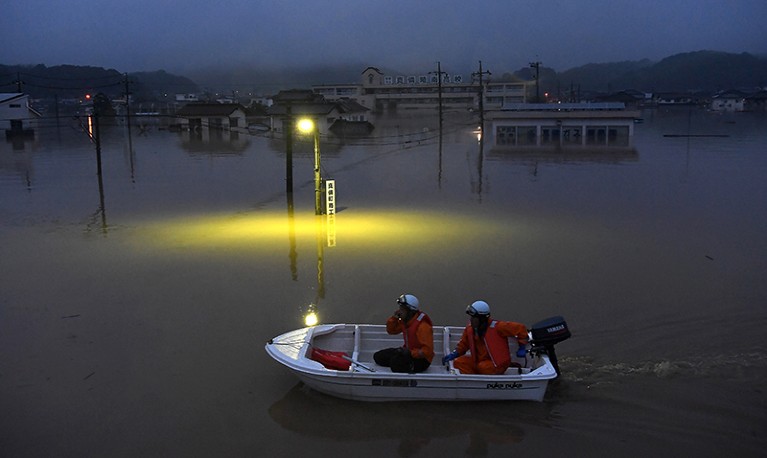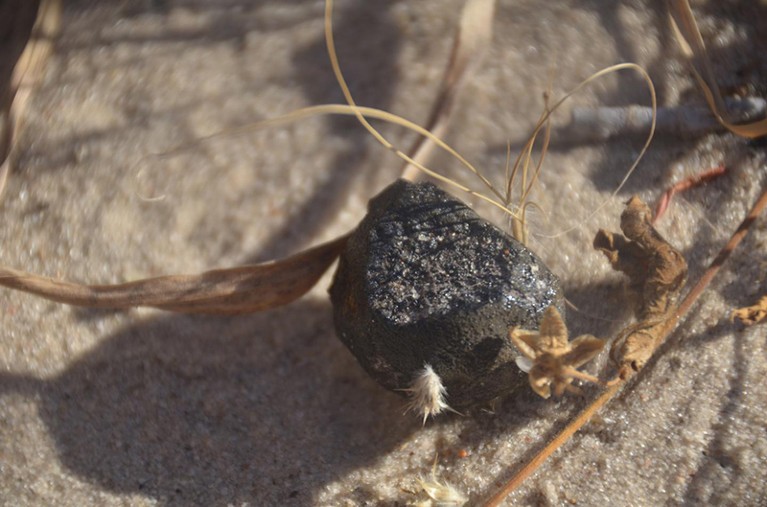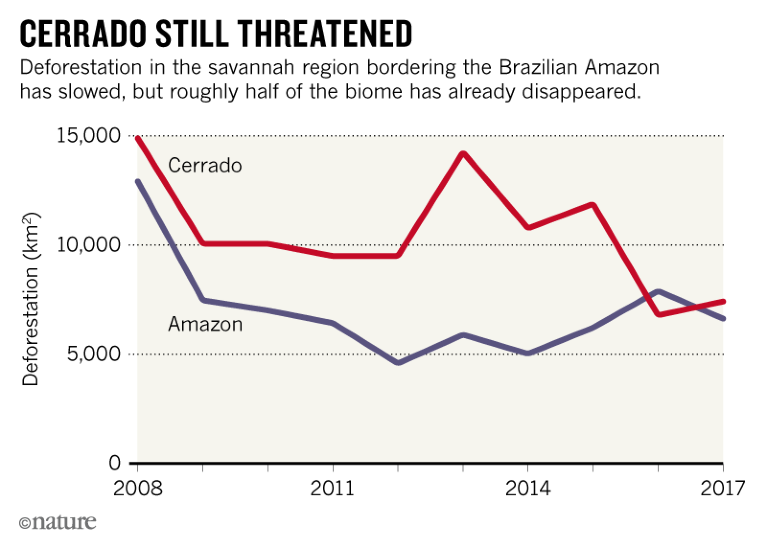ENVIRONMENT
Deadly floods inundate western Japan Torrential rains across western Japan have caused flooding and landslides that have killed more than 100 people. More than 5 million others were ordered or advised to evacuate. The rains started on 5 July and are associated in part with a typhoon. They were the heaviest seen in Japan for decades. Houses collapsed or were buried by landslides, and roads and train routes were closed. Prime Minister Shinzo Abe cancelled a trip to Europe and the Middle East to oversee the disaster response.

Submerged streets in Kurashiki in western Japan, which has been hit by severe floods.Credit: Asahi Shimbun via Getty
POLICY
Gender policy Germany’s main grant-giving agency, the DFG, has unveiled new policies to improve standards around gender equality in funding proposals. At its annual meeting last week, the agency adopted a requirement that, when relevant, grant applicants outline any sex- and gender-related aspects of their research in their proposals. Biomedical researchers, for example, will need to state whether they intend to use male or female human cells in research projects. The US National Institutes of Health implemented similar policies in 2014. The move is part of the DFG’s qualitative gender-equality strategy, adopted in 2017. The agency says that it will further examine its funding programmes and review criteria to identify obstacles to gender inclusion and diversity in research.
Funding autonomy Chinese Premier Li Keqiang says the country will ease restrictive rules governing how research funds are used and cut red tape for researchers. In the past, Chinese researchers have complained that they cannot use grants to pay accountants to manage their finances or to purchase urgently needed equipment, without going through a lengthy bidding process. They say that this puts them at a disadvantage relative to researchers elsewhere. Addressing a meeting of China’s high-powered state council on 4 July, Li vowed to remove such restrictions and give researchers new autonomy to increase their productivity and the vitality of their research. “We must remove the restraints on researchers as soon as possible so that they can devote themselves to their research,” he said.
RESEARCH
Papers retracted The prestigious medical journal The Lancet retracted two articles co-authored by disgraced thoracic surgeon Paolo Macchiarini, after an investigation by his former institute found him responsible for scientific misconduct. The publications, one a research paper published in 2011 and the other a review published in 2012, were retracted on 7 July and relate to an experimental transplant technique that involved implanting artificial windpipes seeded with stem cells into a patient. The surgery, carried out in three people between 2011 and 2013, failed. An investigation released on 25 June by the Karolinska Institute in Stockholm, where Macchiarini was a visiting faculty member, found that he and six co-authors were responsible for misconduct in six studies, two of which are the Lancet papers. The institute found that the articles contained “fabricated and distorted descriptions of the patients’ conditions before and after the operations”, as well as other inaccuracies. The president of the institute, Ole Petter Ottersen, requested that all six studies be retracted.
EVENTS
Science council Two organizations have merged to create the International Science Council (ISC), a non-governmental body that will provide scientific advice to international organizations. The ISC, which launched on 5 July in Paris, unites the International Council for Science and the International Social Science Council, founded in 1931 and 1952, respectively. The ISC’s members include 40 international organizations and more than 140 national and regional bodies, including academies and research councils. Its activities include convening experts to advise on issues of scientific and public importance to organizations such as the United Nations on topics such as biodiversity, climate change and the UN’s sustainable development goals. The ISC elected Daya Reddy, a mathematician at the University of Cape Town, South Africa, as its first president. In his acceptance speech, Reddy called for the ISC to be inclusive of all regions and to involve early-career scientists in its work.
Space fragment Meteorite hunters have retrieved a fragment of the space rock that lit up the sky over Botswana last month. Astronomers spotted the incoming asteroid on 2 June, just hours before it hit Earth and triggered a massive ground search around the impact area. Lesedi Seitshiro, a geologist at the Botswana International University of Science and Technology in Palapye, spied the 18-gram meteorite (pictured) in Botswana’s Central Kalahari Game Reserve. The University of Helsinki, which participated in the search, announced the finding on 6 July. This feat is a rare example of scientists tracking an asteroid from before impact through to when it winds up as fragments on the ground.

An 18-gram fragment of a meteorite was found in Botswana’s Central Kalahari Game Reserve.Credit: Peter Jenniskens
PEOPLE
Environment chief Scott Pruitt, the embattled administrator of the US Environmental Protection Agency (EPA), resigned on 5 July amid a series of ethical and spending scandals. He also provoked controversy over his aggressive agenda to roll back health and environmental regulations. Pruitt sought to reverse a series of rules aimed at reducing greenhouse-gas emissions from power plants, oil and gas operations and other industries. He also changed how the agency approaches scientific research, banning scientists with EPA funding from serving on agency advisory boards and proposing limits on the kinds of research used to justify regulations. Andrew Wheeler, the EPA’s deputy administrator, will be its acting chief until the US Senate can confirm a new nominee.
Chief scientist fired Doug Ford, the premier of Ontario, Canada, fired the province’s first chief scientist on 3 July. The previous administration appointed biomedical engineer Molly Shoichet to the post in November 2017, with the goal of advancing science and innovation throughout Ontario. Shoichet also advised the previous premier on scientific matters. Since Ford’s election on 29 June, he has announced his intention to cancel a cap-and-trade carbon-pricing programme on which the province collaborates with neighbouring Quebec and with California. He has also instructed ministries to cancel subscriptions to publications including newspapers, magazines and trade journals. Some worry that this could include scientific journals.
PUBLISHING
Sweden cut off Researchers in Sweden have lost access to the latest articles published in Elsevier journals, after negotiators failed to agree on a new contract. Talks between the academic publisher and the Bibsam Consortium, which brokers journal-subscription deals on behalf of 85 Swedish institutions, have foundered over the consortium’s demands that the next agreement cover fees charged to researchers to publish their work under open-access terms. The previous deal ended on 30 June. Scientists cannot access papers published after this date, but material published between January 1995 and 30 June remains available. Elsevier said that it is open to talks that would “find a sustainable solution in support of Swedish research and its open-access ambitions”. Similar negotiations have broken down in Germany, where the DEAL consortium, which represents German institutes, said on 5 July that it was suspending talks with Elsevier. DEAL has since 2016 been negotiating with the publisher over the cost of making newly published research open access. Around 185 German institutions now have no contract with Elsevier, but the publisher has mostly granted them continued access to its journals while talks continue.
Open-science plan The French government has unveiled a plan for making publicly funded research open access. Research minister Frédérique Vidal said on 4 July that it should be mandatory for scientists who carry out research supported by government money to publish their results in open-access journals or repositories. The government will invest €5.4 million (US$6.3 million) in 2019 towards developing the plan, and another €3.4 million per year until the end of the government’s term in 2022. The plan will help to develop an existing national open-research repository called HAL, and will allow France to contribute to open-science projects across Europe. The proposal also includes cash to transfer some paywalled research content to open-access repositories.
TREND WATCH
Deforestation in the savannah bordering the Brazilian Amazon spiked by 9% last year. An estimated 7,408 square kilometres of land were cleared for agriculture in the Cerrado region — a sharp drop from several years ago but still more than the total deforestation in the Amazon in the same period. The Cerrado is less than half the size of the Amazon and has already lost roughly half of its original landscape, the Amazon Environmental Research Institute in Brasilia reported on 28 June.

Source: National Institute for Space Research



